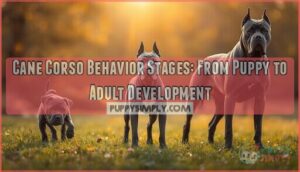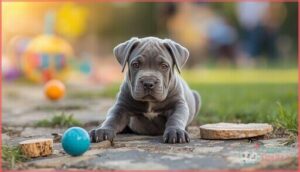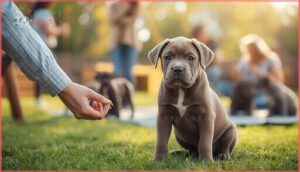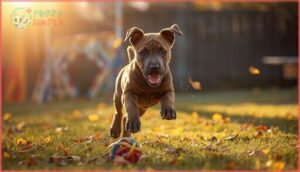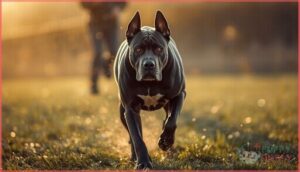This site is supported by our readers. We may earn a commission, at no cost to you, if you purchase through links.
Your Cane Corso puppy won’t behave like an adult for nearly two years—and expecting otherwise sets both of you up for frustration. These powerful guardians move through distinct cane corso behavior stages that shape everything from bite inhibition to territorial responses, with critical windows opening and closing on precise timelines.
Miss the 4-12 week socialization period, and you’ll spend months repairing avoidable reactivity. Rush through adolescence without understanding the second fear period, and your confident puppy may develop lasting anxiety.
Recognizing these developmental phases transforms overwhelming puppy chaos into predictable milestones you can prepare for and navigate with confidence.
Table Of Contents
- Key Takeaways
- Cane Corso Developmental Stages Overview
- Neonatal and Transitional Periods
- Socialization Period in Cane Corsos
- Juvenile Stage and Behavioral Growth
- Adolescent Behavior and Maturity
- Adult Cane Corso Behavior Patterns
- Preventing and Managing Behavior Problems
- Frequently Asked Questions (FAQs)
- What type of exercise is best for a Cane Corso?
- How can I ensure my Cane Corso is properly socialized and trained?
- What is the average lifespan of a Cane Corso?
- How do health issues affect Cane Corso behavior?
- What are signs of senior Cane Corso cognitive decline?
- How does spaying or neutering impact behavioral development?
- Can diet influence Cane Corso temperament and behavior?
- Conclusion
Key Takeaways
- Your Cane Corso’s 4-12 week socialization window is the single most critical period for preventing lifelong reactivity and fear-based behaviors—missing this narrow developmental phase means years of remedial work.
- Physical growth and emotional maturity operate on separate timelines, with your dog reaching full size by 18 months but not achieving behavioral stability until 24-36 months, requiring sustained training consistency throughout adolescence.
- The second fear period (8-14 months) and adolescent hormonal surges (6-18 months) create predictable behavioral regression that tests boundaries and attachment, demanding you maintain structured routines rather than abandoning established training protocols.
- Early bite inhibition training, consistent leadership patterns, and controlled environmental exposure during each developmental stage form the foundation that determines whether your adult Cane Corso becomes a confident guardian or a management challenge requiring professional intervention.
Cane Corso Developmental Stages Overview
Understanding how your Cane Corso grows and changes isn’t just about tracking weight on a chart. This breed moves through distinct developmental windows that shape everything from temperament to trainability.
Let’s break down the timeline, milestones, and factors that determine whether your dog becomes a confident guardian or a behavioral challenge.
Breed-Specific Growth Timeline
Your Cane Corso’s growth follows a distinct pattern you need to understand. This breed experiences three primary development phases:
Understanding these growth phases helps you time early socialization and obedience training to shape your Corso’s temperament during critical developmental windows.
- Rapid Growth (0-6 months): Your puppy gains weight quickly and develops core breed characteristics.
- Slower Growth (6-18 months): Physical maturation continues at a reduced pace.
- Emotional Maturity (15-18 months): Your dog reaches full behavioral development.
Understanding these maturation rates helps you provide appropriate care at each stage. To verify the accuracy of this information, it’s vital to review scientific study methods when evaluating developmental research.
Key Behavioral Milestones
As your puppy matures, you’ll observe predictable Behavior Stages that signal canine development milestones. Between 4 and 12 weeks, Social Learning accelerates—your Cane Corso forms Behavioral Cues through interactions with littermates and humans.
During this critical window, introducing basic obedience training for puppies through brief, focused sessions helps shape positive habits before problematic patterns emerge.
Puppy Temperament begins stabilizing during adolescence (6-18 months), when Emotional Development peaks and Canine Maturation reshapes responses to novel stimuli.
Early controlled puppy social experiences during this window help prevent lifelong behavioral issues by building confidence before adult patterns set in.
Recognizing these Cane Corso behavior and development markers helps you prevent dog behavior problems and solutions before they solidify. Understanding language patterns can also aid in interpreting your dog’s behavioral cues.
Factors Influencing Development
While breed traits set the stage, several forces shape your Cane Corso’s behavior and development through puppy development stages. Genetic Influence establishes baseline temperament, yet Environmental Factors—early exposure to people and stimuli—determine sociability.
Nutrition Effects impact brain maturation and energy regulation during canine development. Maternal Care modulates stress responses, while Training Quality during critical windows prevents dog behavior problems and solutions challenges later.
Structured dog separation anxiety training during early developmental stages helps puppies build confidence and emotional resilience before anxiety patterns become ingrained.
Each factor interacts, making your approach foundational to dog psychology outcomes.
Neonatal and Transitional Periods
Your Cane Corso’s earliest weeks set the foundation for everything that follows. During this time, puppies move from complete helplessness to their first wobbly steps and social interactions.
Let’s look at what happens during these critical neonatal and transitional periods.
Birth to 2 Weeks Behaviors
Your Cane Corso’s first two weeks unfold in quiet predictability. During this neonatal care phase, puppy development stages begin with profound immobility and dependency. Newborn reflexes remain uncoordinated, yet they’re essential building blocks for canine behavioral development.
New owners can prepare for these early stages by following practical guidance for first-time dog owners that emphasizes consistent, brief training sessions.
- Thermal regulation: Your pup relies entirely on mom and littermates for warmth
- Early vocalization: Brief whimpers signal discomfort or hunger needs
- Sleeping dominates: Rest cycles consume nearly all daily activity
- Basic reflexes emerge: Rooting and suckling drive survival
- Minimal stimulation required: The whelping box provides complete security
This puppy stage demands patience—not interaction.
2 to 4 Weeks Neurological Changes
Between weeks two and four, your pup’s world explodes with sensory awakening. This transitional puppy stage marks critical neurological development as brain growth accelerates rapidly.
Sensory maturation brings responsive hearing and refined touch, while motor skills improve through littermate interaction—essential for canine behavior foundations and puppy socialization readiness.
| Neurological Achievement | Timeline | Observable Change |
|---|---|---|
| Social recognition cues | Weeks 2-3 | Reacts to dam and siblings |
| Motor skills coordination | Weeks 3-4 | Purposeful limb movements emerge |
| Brain growth acceleration | Throughout period | Synapses form through interactions |
Early Physical Development
Physical transformation during puppyhood accelerates as muscle growth and bone development support your pup’s newfound mobility. By week three, improved motor skills enable exploratory walks around the whelping area—critical markers in canine development.
Deciduous teeth emerge around the four-week mark, signaling weaning readiness and advancing sensory refinement. This puppy stage demands careful monitoring to guarantee proper physical conditioning without injury risk during these formative dog life stages.
Socialization Period in Cane Corsos
The socialization period between 4 and 12 weeks represents the most critical window in your Cane Corso’s behavioral development. What happens during these early weeks will shape your dog’s temperament, confidence, and responses to the world for the rest of their life.
Let’s examine the key aspects of this vital stage and how you can set your puppy up for success.
4 to 12 Weeks Critical Learning
This is your dog’s most critical learning window—miss it, and you’ll struggle for years. Between 4 and 12 weeks, your Cane Corso’s brain is wired for rapid sensory development and habit formation. Focus on three priorities during this puppyhood phase:
Between 4 and 12 weeks, your Cane Corso’s brain forms lifelong habits—miss this window, and you’ll struggle for years
- Expose your pup to varied sounds, surfaces, and environments to prevent fear periods
- Introduce controlled experiences with unfamiliar people and friendly dogs
- Reinforce calm behavior through consistent positive interactions
Every experience now shapes adult dog behavior.
Primary and Human Socialization
Your Cane Corso needs two layers of social learning—first with littermates, then with you. Primary socialization with mother and siblings teaches bite inhibition and communication signals before 8 weeks. Human socialization follows, requiring daily positive interactions with diverse people from 8–12 weeks to build stable attachment patterns and reduce fear-based reactivity in your adult dog.
| Socialization Type | Core Focus |
|---|---|
| Primary (Littermates) | Bite inhibition, fear response, early social cues from mother |
| Human-Directed | Positive handling, varied caregivers, cooperative veterinary experiences |
| Environmental | Safe spaces, predictable routines, controlled exposure to unfamiliar stimuli |
Preventing Early Behavioral Issues
Think of prevention as your insurance policy against lifelong behavior problems. Structured Puppy Socialization during the critical 4-12 week window, combined with consistent Bite Inhibition exercises, sets the foundation for stable Canine Development.
Use Positive Reinforcement to reward calm responses during Fear Periods. Predictable routines reduce stress-induced reactivity, while early supervision prevents aggression from taking root in puppyhood—before behavior modification becomes necessary.
Juvenile Stage and Behavioral Growth
The juvenile stage marks a significant shift in your Cane Corso’s development as energy levels spike and your puppy becomes more adventurous. Between three and six months, you’ll notice increased curiosity, playfulness, and a strong desire to explore the world around them.
This period demands your focused attention on specific training priorities that will shape your dog’s long-term behavior and responsiveness.
3 to 6 Months Activity Levels
Between three and six months, your Cane Corso enters a whirlwind of growth spurts and shifting energy levels. Expect 60 to 90 minutes of daily exercise, split across multiple sessions, balancing high-energy play patterns with essential rest periods.
Puppyhood demands this rhythm because inadequate exercise fuels reactivity, while structured activity fosters social development, reinforces puppy training fundamentals, and strengthens canine development during this critical phase of dog behavior and training, laying groundwork for proper socialization.
Curiosity and Playfulness
As physical bursts settle, your puppy’s mind comes to the forefront. Curiosity Development drives interactive sniffing, object manipulation, and exploratory play—all peak during this Puppyhood phase. Structured 10–15 minute play sessions, two to three times daily, channel that drive into Playful Learning without overwhelming young attention spans.
Sensory Exploration through varied textures, scent-based puzzles, and Environmental Enrichment builds confidence while preventing destructive outlets during Canine Behavioral Development.
- Interactive Toys transform raw curiosity into problem-solving skills that strengthen impulse control and social bonds.
- Short, frequent play moments double as Puppy Training and Development, embedding recall cues and bite inhibition naturally.
- Diverse handlers and novel environments broaden your dog’s tolerance, reducing fear-based withdrawal and supporting lifelong Socialization in Dog Behavior and Training.
Early Training Priorities
That playfulness opens the door to structured learning. House Training and Crate Introduction anchor your daily routine during this puppy stage, reducing accidents and building predictability.
Short sessions—five to ten minutes—establish Impulse Control through sit, down, and stay cues without overwhelming attention spans. Bite Inhibition exercises redirect mouthing to toys, while gradual Social Exposure to unfamiliar people and surfaces strengthens confidence.
Consistency in puppy training and socialization prevents fear-based reactivity as your Cane Corso matures.
Adolescent Behavior and Maturity
The adolescent phase brings some of the most challenging behavioral shifts you’ll encounter with your Cane Corso. Between 6 and 18 months, your dog’s emotional landscape transforms as hormones surge and independence testing begins.
Understanding what triggers these changes and how to respond will determine whether this stage strengthens or strains your bond.
6 to 18 Months Emotional Changes
Between 6 and 18 months, your Cane Corso enters the adolescent stage, marked by pronounced emotional fluctuations tied to hormonal shifts. Social attachment intensifies, often triggering separation-related behaviors when you leave. Mood regulation becomes uneven as your dog cycles through irritability and heightened alertness, influenced by evolving animal behavior and psychology. This developmental window demands consistency in routines and ongoing socialization to channel increasing independence, prevent fear responses, and stabilize dog behavior through positive reinforcement strategies.
- Increased guardian attachment peaks around 6 to 12 months, sometimes manifesting as distress when left alone
- Hormonal changes between 6 and 18 months can cause mood swings, irritability, or heightened vigilance
- Sensitivity to stimuli intensifies around 9 to 12 months, affecting reactions to unfamiliar people or objects
- Social interaction demands escalate as your dog seeks more play and mental outlets to prevent boredom
- Training responsiveness varies widely during this phase, making consistent daily schedules essential for progress
Second Fear Period Management
Around 8 to 14 weeks—overlapping the socialization window—your Cane Corso may experience a second fear period, characterized by sudden wariness toward once-familiar stimuli. Fear period timing varies slightly by individual, but recognizing its onset allows you to implement desensitization techniques and environmental enrichment during this sensitive puppy stage.
Consistent, short training sessions (5–10 minutes multiple times daily) paired with high-value rewards foster behavioral resilience. Controlled socialization—exposing your dog to novel sights, sounds, and people at a manageable intensity—helps prevent chronic puppy stress management issues. Predictable routines anchor your dog’s emotional stability, supporting healthy canine behavior and psychology.
Monitor for stress signals—pacing, yawning, lip licking—and adjust exposure accordingly. If fear responses persist or generalize, seek guidance from a certified behavior professional to adjust your approach and prevent long-term reactivity in dog behavior.
| Stimulus Type | Initial Exposure Distance | Reinforcement Strategy |
|---|---|---|
| Unfamiliar people | 15–20 feet | High-value treats on calm approach |
| Novel objects | Low-intensity presentation | Scent games and gradual proximity |
| Environmental sounds | Recorded at low volume | Pair sound with play or feeding |
| Non-threatening dogs | Controlled, short interactions | Reward relaxed body language |
Adult Cane Corso Behavior Patterns
Your Cane Corso reaches full emotional maturity somewhere between 18 and 24 months, marking a shift from the unpredictable adolescent phase to a more stable adult temperament.
This doesn’t mean training stops—it means you’re now working with a dog whose personality has fully formed. Understanding what to expect from your adult Cane Corso helps you maintain the foundation you’ve built and strengthen the bond you share.
Reaching Full Emotional Maturity
Your Cane Corso won’t reach full emotional stability overnight. Most dogs achieve mature temperament between 2 and 3 years, showing reliable impulse control and behavioral consistency you can count on.
This developmental stage marks true social maturity—your dog responds predictably to stress, maintains composure around strangers, and displays the balanced confidence proper socialization builds.
Professional assessments help confirm these critical dog maturation milestones.
Social Behaviors and Temperament
Mature Cane Corsos demonstrate confident temperaments rooted in early socialization and ongoing pack dynamics. You’ll notice emotional intelligence through how your dog reads canine communication—body language, vocal tones, environmental shifts.
Temperament testing reveals protective yet stable social bonds with family members, balanced wariness toward strangers. This dog behavior reflects your leadership consistency: clear boundaries shape reliable animal behavior and predictable responses across diverse situations.
Maintaining Positive Habits
Positive reinforcement consistently applied shapes lasting Cane Corso behavior patterns and builds reliable habit formation. Reward systems tied to daily routines—fixed meal times, regular socialization windows, structured training sessions—anchor behavioral stability your dog craves.
Short, frequent practice (5–15 minutes) outperforms marathon drills. This methodical approach transforms puppy training foundations into adult dog behavior you can trust in any setting.
Preventing and Managing Behavior Problems
Prevention starts the moment your Cane Corso arrives home. The strategies you implement early will determine whether your dog becomes a confident, well-mannered companion or develops problems that take years to undo. Here’s what you need to focus on from day one.
Early Socialization Strategies
Your Cane Corso’s future temperament hinges on what happens between 4 and 12 weeks. During this critical puppy stage, you’ll need structured dog socialization and interaction sessions—short, positive encounters with diverse people, environments, and calm dogs.
Use positive reinforcement with high-value treats during each human interaction. Schedule controlled playdates and environmental exposure gradually, always monitoring for overstimulation to prevent fear responses that undermine effective dog training and socialization.
Bite Inhibition and Leadership
Teaching bite control starts the moment your Cane Corso puppy comes home. Redirect hard mouthing with gentle time-outs—pause play for 10 seconds after excessive jaw pressure.
This jaw calibration during socialization prevents aggression later. Strong leadership skills paired with consistent puppy training teach your dog that soft mouths earn continued interaction, while hard bites end the fun immediately.
Consistency in Training and Supervision
Your training schedules must align across every person who manages your Cane Corso. Use consistent cues, standardized equipment, and supervision protocols that document each session.
This behavioral accountability prevents confusion during puppy training and socialization. When your dog hears identical commands at home, in the park, and during group classes, you’ll see faster progress and fewer setbacks in dog behavior.
Addressing Reactivity and Aggression
When your Cane Corso stiffens or fixates on strangers, you’re witnessing Reactivity Triggers before they escalate into behavioral issues. Aggression Prevention starts with Calm Leadership—use Positive Reinforcement to reward disengaged responses, not punishment that amplifies fear.
Structured Trigger Management through controlled exposure shapes dog temperament over time. If your Cane Corso lunges or snaps despite consistent work, consult a professional to address these dog behavior patterns before they solidify.
Frequently Asked Questions (FAQs)
What type of exercise is best for a Cane Corso?
A tired dog is a happy dog—and for your Cane Corso, that means blending aerobic exercise with strength training, mental stimulation, socialization walks, and agility drills to build balanced canine fitness and prevent behavioral issues.
How can I ensure my Cane Corso is properly socialized and trained?
You’ll build Social Bonds and prevent Dog Behavior issues through early Socialization before 12 weeks. Use Positive Reinforcement during brief daily sessions, exposing your Cane Corso puppy to diverse people and environments while teaching bite inhibition consistently.
What is the average lifespan of a Cane Corso?
Most Cane Corsos live around 9 to 11 years, though outstanding care can push some to 12 or 13.
Lifespan factors like diet management, regular exercise, and preventive health screenings greatly impact breed longevity and overall dog health.
How do health issues affect Cane Corso behavior?
Medical conditions like osteoarthritis, seizures, or thyroid dysfunction can trigger behavioral changes in your Cane Corso—causing irritability, reduced activity, or anxiety.
Pain management and health monitoring help distinguish illness from true behavior problems.
What are signs of senior Cane Corso cognitive decline?
Just as people experience memory loss, your senior Cane Corso may show dementia signs like disorientation, confusion, or decreased responsiveness.
Watch for these cognitive decline aging symptoms to provide proper senior care tips during their senior years.
How does spaying or neutering impact behavioral development?
Spay timing and neuter benefits influence behavioral changes through hormone effects. Neutering may reduce aggression, while spaying can shift anxiety responses.
Surgical impact varies—developmental stages matter, but training and environment shape long-term outcomes.
Can diet influence Cane Corso temperament and behavior?
You’re what you eat—and so is your Cane Corso. Nutrient Balance, Omega-3 Benefits, and Dietary Enrichment shape temperament, focus, and stress resilience.
Smart Caloric Management and Gut Health support steadier dog behavior and psychology in everyday canine care and nutrition.
Conclusion
An ounce of prevention is worth a pound of cure—especially with a breed this powerful. Understanding cane corso behavior stages gives you the roadmap to anticipate challenges before they become problems.
Your proactive work during critical windows, particularly that 4-12 week socialization period, determines whether you’ll raise a confident guardian or spend years managing reactivity. The developmental timeline doesn’t accommodate shortcuts, but it rewards consistency. Your puppy’s future temperament is being shaped right now.
- https://www.pawleaks.com/all-17-questions-you-need-to-ask-your-potential-breeder/
- https://academichelpexpress.blog/2024/08/please-use-the-bulleted-points-and-the-rubric-below-to-guide-your-work-your-pa/
- https://www.onelook.com/?loc=olthes1&w=subpoint
- https://x.com/godofprompt/status/1990526288063324577
- https://www.sciencedirect.com/science/article/pii/S0749208123000268

